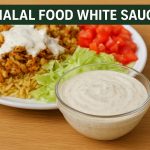I still remember the first time I landed in the United States as a practicing Muslim. The first question that hit me at the airport wasn’t about customs or jet lag—it was, “What foods are halal in the USA?” That question haunted me at every grocery store, restaurant, and even during friendly dinner invites. But over the years, after many mistakes and discoveries, I’ve finally understood how to confidently find halal food in America—and in this guide, I’ll share everything I’ve learned to save you from the same struggle.
My Personal Experience Navigating Halal Food in the USA
Back in my first week in New York, I wandered through supermarkets for hours, trying to read ingredient labels like a detective. The first time I thought I was buying “halal chicken” from a big box store, I later discovered it wasn’t certified halal at all. I felt betrayed, confused, and honestly—just hungry.
Gradually, I found small halal meat shops run by kind uncles who shared not just meat, but community. Then came halal food trucks, halal-certified chains, and even apps that help you locate what foods are halal in the USA. Now, whether I’m traveling in Texas, chilling in Chicago, or flying through Florida—I can find halal food without stress.
But it didn’t happen overnight. And I want to make sure your journey is smoother than mine.
What Problems I Faced While Searching for Halal Food in the USA
1. Lack of Clear Labeling
Most mainstream brands don’t highlight if a product is halal. For example, some chips may use pork-based enzymes, and many frozen meals contain alcohol-based flavorings. It wasn’t easy distinguishing them unless I spent a long time reading the fine print.
2. Hidden Ingredients
Gelatin, rennet, and mono- & diglycerides are just a few of the many hidden non-halal ingredients that can sneak into snacks and desserts. I once bought a fruit-flavored candy for my nephew only to find it had pork gelatin. That was a wake-up call.
3. Fast Food Confusion
I used to think if chicken looked grilled and clean, it must be halal. Wrong. Chains like McDonald’s or Wendy’s in the US do not serve halal-certified meat. This confusion can lead to accidental consumption if we’re not careful.
4. Finding Trustworthy Sources
Without local Muslim friends or communities, it was tough to know which stores, restaurants, or products I could trust. Google Maps doesn’t always tell you the full story.
Suggestions and Solutions That Worked for Me
1. Stick to Halal-Certified Products
Always look for certification logos from organizations like Halal Food Council USA, IFANCA, or HFSAA. These labels can be your best friend.
2. Use Halal-Focused Apps
- Muslim Pro: Offers halal restaurant locators
- Scan Halal: Scan a barcode to check if the product is halal
- Zabihah: A comprehensive halal food guide in the USA
3. Join Muslim Facebook Groups & Communities
I found amazing local groups like “Halal Foodies of Los Angeles” and “Muslims in New Jersey” where people regularly post reviews, halal alerts, and product discoveries. Community knowledge is powerful.
4. Shop at Halal Groceries
Almost every major city has a halal grocery store. These places usually stock everything from zabihah meat to snacks, spices, and frozen foods that are halal and imported from Muslim countries.
5. Bookmark Reliable Resources
One of the best guides I found recently was this resource from Halal Thinking. It covers regional options and what foods are halal in different parts of the USA:

Expert and Authentic Insights: Understanding What Foods Are Halal in the USA
✅ What Foods Are Commonly Halal in the USA?
- Fruits, vegetables, grains, legumes
- Certified halal chicken, beef, lamb, and goat
- Fish and most seafood (according to most scholars)
- Eggs and dairy (if no cross-contamination with haram)
- Halal snacks, frozen meals, and sweets (from certified sources)
- Vegan products (usually safe but still check labels)
❌ What Foods to Avoid Unless Certified
- Gelatin (unless halal or fish-based)
- Cheese (contains animal rennet unless labeled halal or vegetarian)
- Processed meats like hot dogs, bacon, sausages
- Alcohol-based extracts or flavors (in desserts, sauces)
- Pre-cooked meals or restaurant meat without certification
🔎 Trusted Halal Certification Bodies in the USA
Frequently Asked Questions About What Foods Are Halal in the USA
Is all chicken in the USA halal?
No. Most supermarket chicken is not halal unless labeled. Look for “Zabihah Halal” certification.
Can Muslims eat McDonald’s in the USA?
No. McDonald’s USA does not serve halal meat as of now.
Are vegetarian foods automatically halal?
Not always. Some vegetarian products may still include alcohol, gelatin, or animal-based rennet.
Are fast food restaurants safe?
Chains like Subway, Chick-fil-A, and Taco Bell may have vegetarian options, but always verify ingredients and cross-contamination risks.
How can I be sure what I’m eating is halal?
Check for halal certifications, ask questions at restaurants, use apps, and join Muslim communities for advice.
Final Thoughts
My journey navigating what foods are halal in the USA has been full of learning, mistakes, and blessings. If you’re new here or just looking for reassurance, remember: there’s a growing halal ecosystem in America. With the right tools, communities, and awareness, you can enjoy food confidently and faithfully.
I hope this guide helps answer 80% of your concerns and gives you confidence in your halal lifestyle here in the States. And if you’re still unsure, don’t hesitate to reach out or explore more on sites like Halal Food in the USA.
Author: Miraz Raj
Email: iammirazraj@gmail.com



